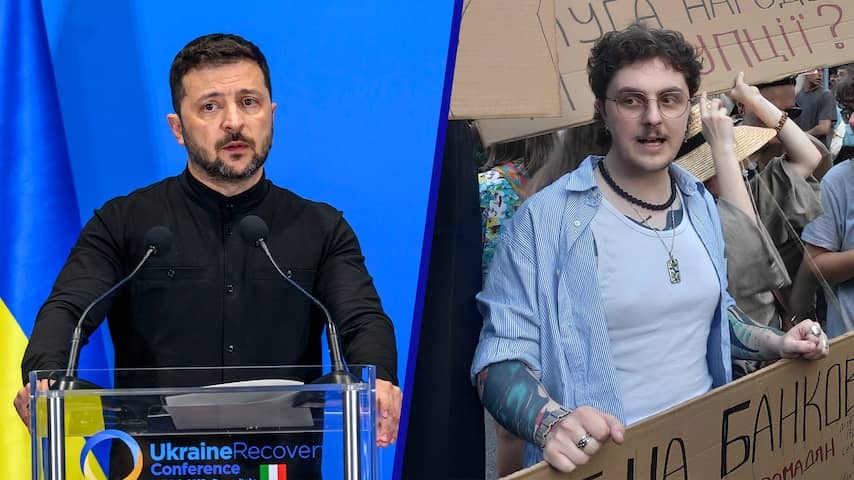 Here’s the extracted, translated, and formatted content:
Here’s the extracted, translated, and formatted content:
Ukrainian streets flooded with protesters on Tuesday. The largest wave of protests since the Russian invasion was sparked by a controversial law. Under pressure, President Volodymyr Zelensky yielded on Wednesday and promised adjustments. Is support for him crumbling?
The demonstrations expose the divisions in Ukraine, says analyst Michel Michaloliákos. He is a geopolitical analyst for Europe and founder of the The Hague Institute for GeopoliticsNow. “Zelensky is falling in the polls, and the protests are a sign of the times.” He sees support for the president declining and considers the mass demonstrations a striking development.
László Marácz, Professor of East European Studies at the University of Amsterdam, agrees. “The demonstrations show that citizens are fed up with this policy and the war. These demonstrations are not nothing, because this is the first time we have seen this since the outbreak of the war with Russia, more than three years ago.”
Ukraine faces many domestic challenges, and Ukrainians are becoming war-weary, says Michaloliákos. “Ukraine is under tremendous pressure. At the beginning of wars, there is always support for the leaders of a country. It is not surprising that criticism later increases.”
Marácz also mentions these challenges: “Russia is gaining ground every day, which does not seem to be abating.” For example, the Russians managed to slip into the city of Pokrovsk last week after a long battle. Although the Russian territorial gains are minimal, the pressure remains unabated. “There are problems with arms deliveries and shortages of manpower. The problems for Zelensky are piling up.”
Zelensky is like ‘a cat in a corner’
It is therefore not surprising that Zelensky is seizing more power to turn the tide, says Marácz. “To some extent, it is understandable that Zelensky is doing this, but practice usually shows that this makes matters worse. A cat in a corner makes strange jumps: due to the accumulating problems, he sees no other way out.”
Michaloliákos finds Zelensky’s steps understandable in wartime: “You have to be able to make decisive decisions. And that can conflict with democratic values.”
That there were demonstrations in Ukraine is not entirely bad news, according to historian Nicolaas Kraft van Ermel-Nijland. “Fortunately, Ukrainian citizens are sharp on corruption. The call for a ‘normal’ country is getting louder and louder. The war has only strengthened that call. People are even willing to give their lives for it,” says the lecturer in East European History at the University of Groningen.
The democratic system is therefore responding strongly, Michaloliákos also believes. “Tuesday’s protests show how strong the democratic system is. And Zelensky is listening to that in this case.” Although the analyst calls the demonstrations “worryingly” large, he emphasizes that millions of Ukrainians are not demonstrating and continue to support Zelensky.
Yet there are indeed worrying developments, according to Michaloliákos: “Zelensky sometimes tries to make decisions outside of parliamentary control, makes dubious changes in the military leadership, and signed the controversial law before the protests. So it falls within a pattern.”
Internal divisions put international support under pressure
The pattern in which Zelensky seizes power can harm European support for Ukraine. The EU has long been concerned about corruption in Ukraine. That is why combating corruption is one of the spearheads. Only then can the country join the EU. “This week’s controversial law will be a concern for the EU, but not a breaking point,” thinks Michaloliákos.
It could have consequences for the war if the demonstrations in Ukraine continue, says Marácz: “Internal polarization is not good for support for Ukraine. Countries that are already critical of support, such as Hungary and Slovakia, will see this as confirmation of their position.”
EU ‘seriously concerned’ about the law
President Volodymyr Zelensky reversed a law on Wednesday that he had signed a day earlier. With that law, two important anti-corruption services – NABU and SAPO – came under the direct authority of the Attorney General. That in turn falls under the president.
Critics felt that the president would have too much say in ongoing corruption cases.
The European Union was concerned about the law: “The anti-corruption institutions are crucial to Ukraine’s transformation plan and must operate independently to fight corruption and maintain public trust,” said Guillaume Mercier, spokesman for the European Commission.
European Commissioner for EU Enlargement Marta Kos expressed her “serious concern” about the approval of the bill: “The dismantling of key guarantees that protect the independence of NABU is a serious step back,” Kos wrote on X. “Independent organizations like NABU and SAPO are essential for Ukraine’s path to the EU.”